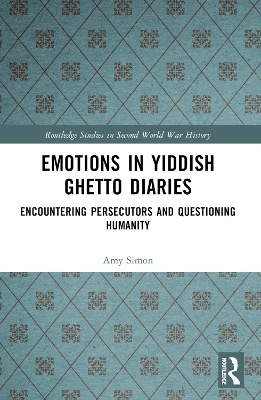
Emotions in Yiddish Ghetto Diaries
Encountering Persecutors and Questioning Humanity
Seiten
2024
Routledge (Verlag)
978-1-032-44019-4 (ISBN)
Routledge (Verlag)
978-1-032-44019-4 (ISBN)
- Lieferbar (Termin unbekannt)
- Versandkostenfrei innerhalb Deutschlands
- Auch auf Rechnung
- Verfügbarkeit in der Filiale vor Ort prüfen
- Artikel merken
This book highlights the benefits of reading with empathy and paying attention to emotions for understanding the experiences of people in the past, especially those facing tragedy and trauma.
This book uses an empathic reading of Yiddish diarists’ feelings, evaluations, and assessments about persecutors in the Warsaw, Lodz, and Vilna ghettos to present an emotional history of persecution in the Nazi ghettos.
It re-centers the daily experiences of psychological and physical violence that made up ghetto life and that ultimately led victims to use their diaries as a place of agency to question and attempt to maintain their own beliefs in pre-war Jewish and Enlightenment ethics and morality. Holocaust scholars and students, as well as people interested in personal narratives, interpersonal relations, and the problem of dehumanization during the Holocaust will find this study particularly thought-provoking.
Essentially, this book highlights the benefits of reading with empathy and paying attention to emotions for understanding the experiences of people in the past, especially those facing tragedy and trauma.
This book uses an empathic reading of Yiddish diarists’ feelings, evaluations, and assessments about persecutors in the Warsaw, Lodz, and Vilna ghettos to present an emotional history of persecution in the Nazi ghettos.
It re-centers the daily experiences of psychological and physical violence that made up ghetto life and that ultimately led victims to use their diaries as a place of agency to question and attempt to maintain their own beliefs in pre-war Jewish and Enlightenment ethics and morality. Holocaust scholars and students, as well as people interested in personal narratives, interpersonal relations, and the problem of dehumanization during the Holocaust will find this study particularly thought-provoking.
Essentially, this book highlights the benefits of reading with empathy and paying attention to emotions for understanding the experiences of people in the past, especially those facing tragedy and trauma.
Amy Simon holds the Farber Family Chair in Holocaust Studies and European Jewish History at Michigan State University. She writes about Holocaust diaries and pedagogy, including the article, "Imperfect Humans and Perfect Beasts: Changing Perceptions of German and Jewish Persecutors in Holocaust Ghetto Diaries" (2020).
1. Introduction: Reading Ghetto Diaries 2. The Cities and Their People 3. The Art of Cruelty 4. Censure and Casting Out 5. The Deepening Darkness 6. Conclusion: Humanity, Expectation, Agency, and Morality
| Erscheinungsdatum | 07.11.2024 |
|---|---|
| Reihe/Serie | Routledge Studies in Second World War History |
| Verlagsort | London |
| Sprache | englisch |
| Maße | 156 x 234 mm |
| Gewicht | 453 g |
| Themenwelt | Geschichte ► Allgemeine Geschichte ► 1918 bis 1945 |
| Geisteswissenschaften ► Geschichte ► Regional- / Ländergeschichte | |
| Geschichte ► Teilgebiete der Geschichte ► Militärgeschichte | |
| ISBN-10 | 1-032-44019-8 / 1032440198 |
| ISBN-13 | 978-1-032-44019-4 / 9781032440194 |
| Zustand | Neuware |
| Haben Sie eine Frage zum Produkt? |
Mehr entdecken
aus dem Bereich
aus dem Bereich
ein Psychologe erlebt das Konzentrationslager
Buch | Hardcover (2024)
Kösel (Verlag)
22,00 €
Mythos „Stauffenberg-Attentat“ – wie der 20. Juli 1944 verklärt und …
Buch | Hardcover (2024)
Goldmann (Verlag)
24,00 €


